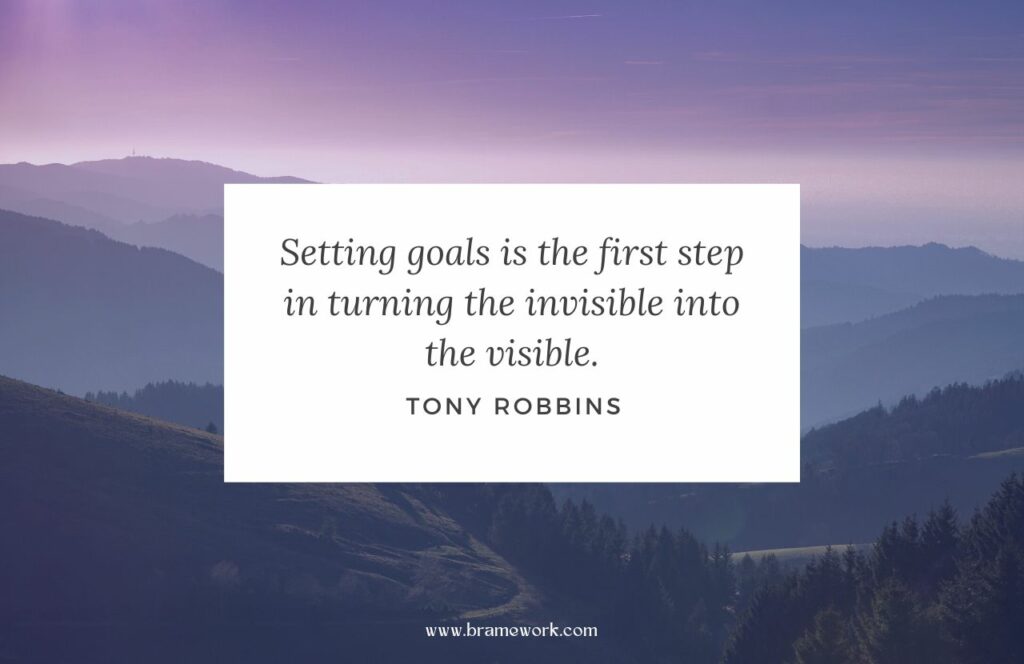11 Surprising Goal Setting Statistics To Crush 2024

Are you looking for some of the most surprising goal setting statistics to jumpstart your year?
With 2024 just around the corner, now’s the perfect time to set some goals for the new year.
Goal setting can be a powerful tool for personal and professional growth.
It helps you focus on what you want to achieve, gives you a plan for how to get there, and keeps you accountable in case you stray off track.
But how common is goal setting, and how successful are people in achieving their goals?
Let’s look at some goal setting statistics and research to highlight how useful it is!

How effective is goal setting?
In the words of Tony Robbins, “Setting goals is the first step in turning the invisible into the visible.”

And he’s not wrong – part of why so many people don’t achieve their goals is because they never set any in the first place.
1. Goals help you determine what you want to achieve in life.
Goals give you a clear idea of what you want to accomplish and can help prioritize the steps needed to get there.

You can create short-term goals that fit into larger, long-term plans for your life.
Plus, you can focus on the end result and how it will impact your life rather than just the immediate gratification of completing a task.
2. Goal setting keeps you focused.
Knowing your goals can also help keep you focused and on track.
Without goals, it’s easy to get sidetracked or lose motivation, but when a clear end goal is in mind, staying motivated and focusing on the steps necessary to achieve it is easier.

When you know what you’re working towards, it’s easier to say no to distractions and things that don’t align with your goals.
Henry Ford’s inspirational words, “Obstacles are those frightful things you see when you take your eyes off your goal,” show how important it is to keep your eye on the prize.
You free yourself from the anxiety, worry, and doubt of not knowing what you want.
Create SEO-Optimized Blog Posts with First Draft PRO in Minutes!
👋 Say Goodbye to Endless Hours of Research and Writing
3. Goal setting increases your motivation and productivity.
Denis Waitley said, “The major reason for setting a goal is for what it makes of you to accomplish it. What it makes of you will always be the far greater value than what you get.”

When you have a goal, you’re more likely to be motivated and productive. You push yourself harder because you want to achieve something.
And once you reach that goal, the sense of accomplishment can be highly rewarding and motivating for future goals.
4. Goals help you dream big!
“Shoot for the moon. Even if you miss, you’ll land among the stars.” – Les Brown
Goals can also help you dream bigger and go beyond your comfort zone.

When setting goals, think about what’s truly important to you and don’t be afraid to aim high.
Challenge yourself to set goals that may seem intimidating at first, but will push you to accomplish more and grow as an individual.
For example, if you want to monetize your blog, instead of setting a goal to make an extra $500 in the next year, set a goal to bring in $10,000.
It may seem impossible at first, but with dedication and hard work, it can become a reality.
🔍 Find Keywords That Actually Drive Traffic
Stop guessing and start ranking. Discover high-value keywords, analyze trends, and dominate your niche free and fast.
How many people who set goals achieve them?
Research suggests that 92 percent of people who set goals fail to achieve them.
Unfortunately, setting goals is just the first step. Following through and achieving them is often the hard part.

It’s crucial to create attainable, specific, and realistic goals. Otherwise, it’s easy to lose motivation and give up on the goal altogether.
But don’t let that discourage you – there are plenty of tips and strategies for setting effective goals and increasing your chance of success.

Write them down, break them into smaller steps, hold yourself accountable, and track your progress.
Are people who set goals more successful?
The answer is yes – people who set goals are more successful. A study by Dominican University found that people who set goals are 43 percent more likely to achieve them.

But it’s not just about setting any old goal. The study also found that people who set specific and challenging goals are more likely to achieve them than those who set easy goals.
For example, let’s say you hope to boost your website conversions by 50 percent in the next six months. That’s a specific and challenging goal, but also attainable with effort and planning.

On the other hand, a goal like “increasing website conversions” is vague and, therefore, may be harder to achieve.
So while planning alone might not guarantee success, statistics on goal setting show that it greatly increases your chances by giving you a clear direction and motivating you to reach them.
What does research say about goal setting?
There’s a lot of research on goal setting, and the results are clear – goal setting works.
Here are 9 Surprising Goal Setting Stats to Know:
- According to a survey, visualizing and imagining your goals can make you twice as confident in achieving them. Only 31 percent of those who don’t visualize feel confident about achieving their goals, as opposed to 59 percent of those who visualize.
- A study by Forbes found that people who vividly describe their goals in written form are 1.2 or 1.4 more likely to be successful than those who don’t.
- 45 percent of people achieve their New Years’ resolutions.
- A study by the Journal of Applied psychology states that presenting weekly progress reports of your goal increases your success rate by 40 percent.
- 14 percent of people with goals are 10 times more successful than those without goals.
- People have a 65 percent chance of reaching a goal if they have an accountability partner.
- In 90 percent of the studies, challenging and specific goals resulted in better performance than easy goals, no goals, or “do your best” goals.
- 35 percent of all people cannot accomplish their goals set during New Year’s Resolution because of unrealistic goals.
- Over 1,000 studies show that setting high goals results in better task performance, motivation, and persistence compared to vague goals.
Did any of these goal setting statistics surprise you?
5 Tips for Setting Your Goals This Year
Now that you know about the most interesting goal setting statistics, let’s go through a few tips to keep in mind as you set your goals for this year.
1. Set SMART goals
Make sure your goals are specific, measurable, attainable, relevant, and time-bound.

These guidelines can help make your goals clear and achievable.
For example, instead of focusing on how many leads you want to generate, set a specific goal of generating 50 leads in the next three months.
Get Your List of Catchy Blog Titles for Free TODAY!
2. Write your goals down
List your goals to keep yourself accountable and ensure you’re taking action towards them.

Keep your list where you’ll see it often, such as on your desk or by your bedside, to keep them top of mind.
You can also set your phone’s lock screen as a reminder of your goals.
3. Break down large goals into smaller, manageable steps
Breaking down large goals into smaller steps can make them seem less overwhelming and help you stay on track.

For example, if your goal is to increase revenue by 20 percent, break it down into monthly or weekly targets.
You can also break it down into specific actions, such as reaching out to a certain number of potential clients or launching a new marketing campaign.
4. Find an accountability partner
Find someone who can regularly check in on your progress and hold you accountable.

This could be a colleague, other bloggers, friend, or family member who is also setting goals and willing to support you in achieving yours.
Consider setting up regular check-ins or a deadline for when you want to accomplish your goals.
5. Visualize yourself achieving your goal
Imagining yourself achieving your goals can increase your confidence and motivation.

Before bed or in the morning, take a few minutes to close your eyes and visualize what it may feel like once you’ve accomplished your goal.
You can also create a vision board with pictures or words that represent your goals and inspire you to work toward them.
Final Thoughts on The Best Goal Setting Statistics
The new year may be your time to start fresh, but that doesn’t mean you have to wait until January 1st to set your goals.

There are countless statistics on achieving goals, so why not start now?
Set yourself up for success by envisioning your goals, breaking them down into manageable steps, staying accountable, and using SMART guidelines. And remember to celebrate your achievements along the way.
If you’re to grow your blogging career this year and crush your goals, subscribe to our email newsletter for regular blogging tips and resources.
Some Photos Courtesy of Canva.com
🎓 Join the Ultimate Blog Ranking Academy!
Unlock the Secrets to a $10,000 per-month Blogging Income




